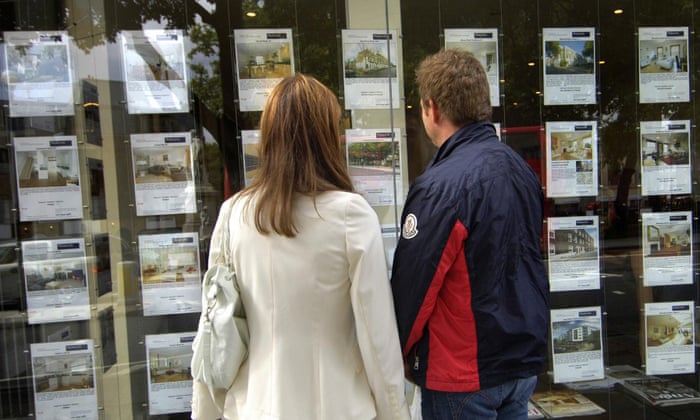UK house prices fall in January as Brexit puts off buyers
Biggest monthly drop since April comes while annual growth slows to 0.8% – Halifax
House prices in the UK fell 2.9% in January from December and the annual growth rate slowed sharply as Brexit fears put off buyers, according to Halifax, one of Britain’s biggest mortgage lenders.
Halifax said the monthly drop took the average house price down to £223,691 and came after a 2.5% rise in December. It is the biggest monthly drop since last April, when prices declined 3.1%. Analysts cautioned that the monthly house price changes tend to be volatile.
In the three months to January, house prices were 0.8% higher than in the same three months a year earlier. This is down from the 1.3% annual growth rate recorded in the three months to December.
Russell Galley, the managing director of Halifax, said: “Attention will no doubt be drawn towards the monthly fall of 2.9% from December to January, the second time in three years that we have seen a drop as a new year starts. However, the bigger picture is actually that house prices have seen next to no movement over the last year, with annual growth of just 0.8%.
“There’s no doubt that the next year will be important for the housing market, with much of the immediate focus on what impact Brexit may have. However, more fundamentally it is key underlying factors of supply and demand that will ultimately shape the market.”
Other surveys and the official data point to a slowing UK market, with prices declining in London and parts of the south-east because of Brexit uncertainty, stamp duty changes and a lack of affordable properties.
According to Nationwide, Britain’s biggest building society, annual growth in house prices almost ground to a halt in January, declining to 0.1% – the slowest annual rate since February 2013.
Mark Harris, the chief executive of mortgage broker SPF Private Clients, said: “Flat growth is probably the best we can hope for, given the current tricky political situation we find ourselves in. Brexit has caused a slowdown in purchase activity as would-be buyers sit on their hands, waiting for the outcome before committing to something as major as buying a new home.” He noted that many lenders had reduced their mortgage rates to pull in customers.
Jeremy Leaf, a north London estate agent, said interest from buyers was “very patchy” and did “not expect any significant improvement at least until the odds on a Brexit deal improve”.
Economists also expect the housing market to stay sluggish this year.
Hansen Lu, a property economist at consultancy Capital Economics, thinks a house price collapse is unlikely, even if the UK departs the EU without an agreement. “We, therefore, expect annual house price growth to bump along at its current rate, ending 2019 at 1%.
“That is assuming the UK exits the EU with a deal. If the UK exits without a deal, house price growth would be even slower, or even fall gently. But a correction in prices would still be unlikely.”


No comments:
Post a Comment